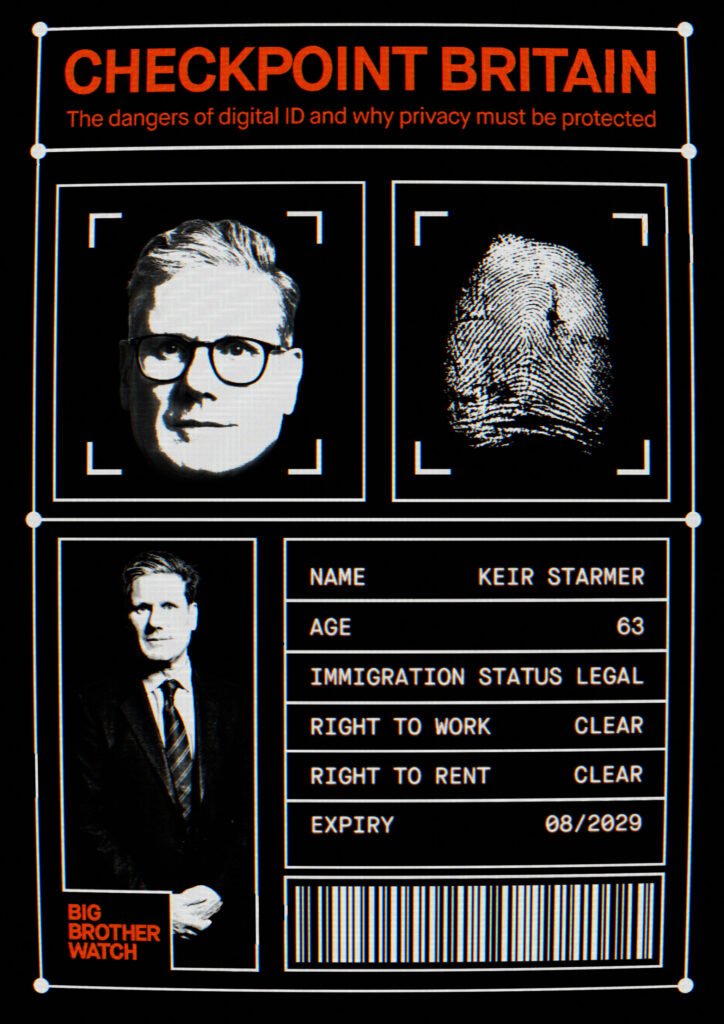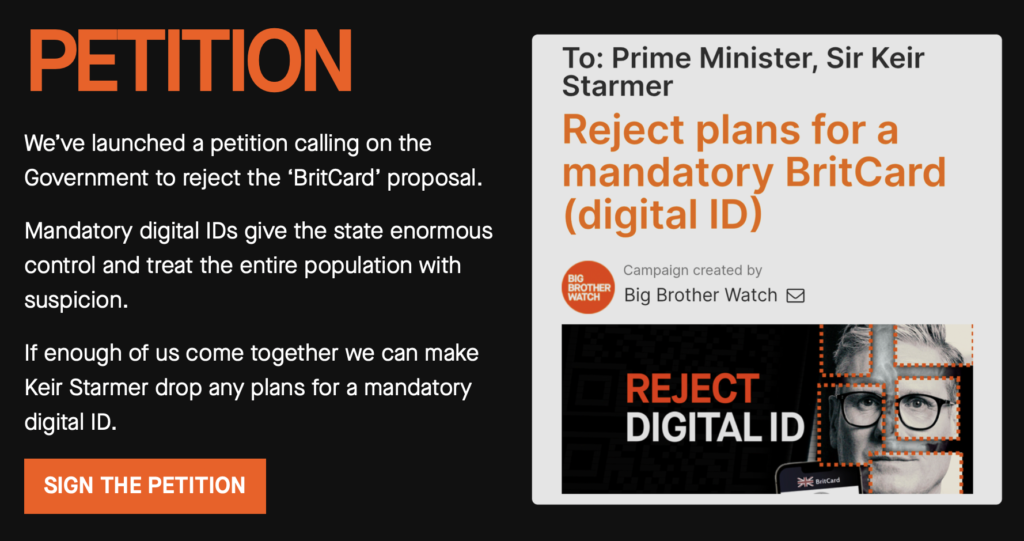The UK government, under Prime Minister Keir Starmer, is implementing a new digital ID scheme, often referred to as a “Brit Card”, which is set to become mandatory for Right to Work checks by the end of the current Parliament, with a full rollout expected by 2029.
The UK government’s plan to implement a mandatory digital ID system, primarily driven by immigration policy, lacks sensitivity to public sentiment and historical context. The previous abolishment of identity cards in the UK suggests a deep-seated public resistance to such measures. The government’s framing of the BritCard as an immigration enforcement tool is anticipated to further erode trust among citizens.
Keir Stamer Facing Cabinet Backlash
The Prime Minister is now being criticized for the digital ID cards, as there are fears that they might push voters away.
Then, after a week, Keir Stamer meets PM Modi. Despite criticism, Keir is looking at India’s digital ID system, Aadhar, for inspiration for its own ‘Brit Card’.
The public has raised significant concerns regarding the promotion of mandatory, state-linked digital identification, health, and payment systems in other countries by the Government of India.
While India’s advancements in digital public infrastructure are globally recognized by the WEF members, exporting the mandatory application of these systems risks institutionalizing exclusion, infringing on fundamental rights, and empowering non-democratic governance models abroad.
Indians urge the Government to focus its international outreach on promoting open, voluntary, and rights-respecting Digital Public Goods (DPGs), rather than encouraging or facilitating the adoption of mandatory digital mandates.
The majority of the public is aware of who is responsible for this.
Related Article
The UK’s proposed digital ID card system, dubbed “BritCard,” has faced significant public backlash, primarily due to concerns over privacy, potential for state control, and its mandatory nature. This opposition is rooted in a historical resistance to national identity cards in Britain, which have traditionally been viewed with suspicion and associated with authoritarianism.
A key driver of the backlash is the perception that the digital ID would fundamentally alter the relationship between citizens and the state, potentially leading to a “papers, please” society. Civil liberties groups, such as Big Brother Watch, have voiced strong opposition, arguing that the system poses serious risks to privacy, security, and equality. They highlight concerns about the vast amount of personal information that would be stored on a government app and the potential for this data to be a “honeypot for hackers”. The Liberal Democrats party has also stated it will not support mandatory ID cards, with a spokesperson expressing worry that people would be “forced to turn over their private data just to go about their daily lives”.
The mandatory aspect of the BritCard, particularly for employment verification, is another major point of contention. Critics argue that when a system is mandatory for work and linked to immigration enforcement, “user control” over personal data becomes largely meaningless. This contrasts sharply with the European Union’s Digital Identity Wallet, which is designed around user-controlled data management and selective disclosure, allowing citizens to choose what information they share and when. The UK’s approach is seen as a digitized national identity card, primarily aimed at combating illegal immigration, rather than a privacy-first tool for citizens.
Furthermore, there are concerns that the digital ID could marginalize already vulnerable groups, such as those with disabilities, low income, or the elderly, who may have reduced access to online services. Research groups have suggested that it could create additional barriers and exacerbate risks of exploitation and social exclusion for undocumented migrants. Even political rivals, such as the Conservative Party and Reform UK, have dismissed the digital ID plans as a “gimmick” or a “cynical ploy” that will not effectively address illegal immigration, while simultaneously increasing state power over citizens. A petition against the introduction of digital ID cards on the UK Parliament’s website has garnered over 1.6 million signatures, demonstrating significant public disapproval.

The report by Big Brother Watch delves into the emerging debate surrounding mandatory digital identification (ID) in the UK, emphasizing civil liberties and the potential risks associated with such systems. From its inception, the idea of implementing mandatory ID has been met with skepticism, leading to its rejection in favor of safeguarding personal freedoms. However, recent political shifts have reignited discussions, framing digital IDs as a solution to challenges such as unauthorized immigration and efficiency in public services.
Shift in Political Stance
Following the election of the Labour government in July 2024, initial assurances against mandatory digital IDs were quickly undermined by internal pressures. Proposals have emerged advocating Universal Digital IDs, dubbed ‘BritCard’, aimed at enhancing public service efficacy while allegedly combating illegal immigration. As of September 2025, parliamentary inquiries and civil service discussions indicate a significant pivot towards implementing such systems.
Public Discourse and Opinion
A recent poll conducted by YouGov reveals widespread public apprehension regarding the risks posed by digital IDs, with a substantial majority expressing distrust in governmental data security. With over 90,000 signatures on petitions against digital ID schemes, there seems to be a strong resistance to potential infringements on civil liberties, signaling that public sentiment may not align with political ambitions.
The Risks of Digital ID
Privacy Concerns
Mandatory digital IDs pose a fundamental shift in the relationship between individuals and state authority, effectively normalizing constant identity verification across numerous daily interactions. This erosion of privacy rights raises significant ethical questions, particularly in how personal data would be aggregated, maintained, and potentially misused. The looming prospect of function creep could see these systems expanding beyond their original intentions, invading all facets of citizens’ lives.
Surveillance and Data Security
Digital IDs inherently facilitate extensive data collection, creating databases uniquely identifying individuals. The resulting data amalgamation could expose the population to mass surveillance, disallowing the presumption of innocence by inherently treating everyone as a suspect. Additionally, cybersecurity vulnerabilities associated with digital ID systems raise alarms about potential data breaches, exemplified by past incidents within governmental departments.
Exclusion and Errors
The report accentuates the potential exclusionary effects of digital ID systems, particularly on marginalized communities. Historical evidence suggests that inaccuracies in identity representation within government databases could deny access to essential services, exacerbating existing inequities. Proposed measures that inadequately address these issues could lead to devastating consequences for vulnerable populations.
Abuses of Power
Empowering agencies with access to broad personal data raises concerns about possible abuses. Rhetoric around efficiency and security may mask authoritarian tendencies, ultimately weaponizing digital ID systems against dissenters or marginalized groups, reminiscent of oppressive practices observed in other countries.
The push for universal, mandatory digital ID systems represents a significant threat to the civil liberties of UK citizens. The report urges rejection of these proposals, reinforcing the idea that civil liberties should remain integral to government practice. As the Labour government grapples with internal and public pressures concerning this issue, it must heed historical warnings against infringing on personal freedoms under the guise of efficiency. Thus, careful guardrails should be established to protect individual rights in the rapidly evolving digital landscape.
Big Brother Watch: Urgently reject plans for a mandatory digital ID

Copy and paste the Link: https://you.38degrees.org.uk/petitions/reject-plans-for-a-mandatory-britcard-digital-id
❌ Reject digital ID
— Big Brother Watch (@BigBrotherWatch) September 25, 2025
✊Britain has a long and proud history of rejecting proposals for mandatory ID, and we should reject this one too.
Sign & share the petition ⤵️https://t.co/Nz0lv55UR8
5 KEY ARGUMENTS AGAINST MANDATORY DIGITAL ID
1. CHECKPOINT SOCIETY
A sprawling digital ID system would make us all reliant on a digital pass to go about our daily lives and usher in a new era of mass surveillance.
It could easily impact a range of everyday activities from access to GP appointments, banking, online voting, receiving benefits and even trips to the pub.
We would be increasingly required to prove who we are, turning us into a checkpoint society. We know what it is like to be subject to identity checks when travelling outside of the country – imagine these borders being replicated inside our country. The state would gain enormous control and treat the entire population with suspicion.
2. MISSION CREEP
A digital ID would not only be used to prove who you are.
Digital ID systems have already been proposed as solutions to a range of issues, from fighting terrorism to controlling immigration and even fixing potholes.
Let us be clear – barcoding Britain will not solve all of these problems.
Instead, such a system risks morphing into a far-reaching instrument of state control, such as being linked to facial recognition technology, or even used to sort and segregate people based on health status.
3 HONEYPOT FOR HACKERS
A digital ID system would force the entire adult population in the UK onto one giant database. This would create a honeypot for hackers and foreign dictators who, like we’ve seen with numerous cyberattacks, have a track record of trying to breach databases. They expose not just names and emails, but intimate details of people’s lives
The evidence is clear – a majority (63%) of the British public do not trust the Government with keeping their data secure, independent YouGov polling commissioned by us reveals.
4. DIGITAL DISCRIMINATION
Mandatory digital ID would seriously damage equality in the UK. People with disabilities, low income or the elderly are more likely to have reduced access to online services, particularly where digital identity is a requirement.
Only about 20 per cent of Universal Credit applicants can use online ID verification methods.
Forcing a digital ID on every adult in the UK could mean that a large number of people are unable to freely participate in society.
5. UNDEMOCRATIC AND ILLIBERAL
From WWII IDs to Blair-era ID cards introduced in the wake of 9/11 and vaccine passports in 2021, the British public has repeatedly and successfully fought back against identity card schemes.
The fight against ID cards is about more than just databases – it’s about protecting our rights and freedoms. It’s about empowering citizens against overbearing authorities. We are more than just a number, and registration code, or worse, a health risk score.
We must now reject plans for an all-encompassing digital ID system that grants itself sweeping access to our private lives with the promise to monitor, manage and predict us.
Checkpoint Britain: The dangers of digital ID and why privacy must be protected
About Big Brother Watch
Big Brother Watch is a civil liberties and privacy campaigning organisation, fighting for a free future. We’re determined to reclaim our privacy and defend freedoms at this time of enormous change.
We’re a fiercely independent, non-partisan, and non-profit group who work to roll back the surveillance state and protect rights in parliament, the media, or the courts if we have to. We publish unique investigations and pursue powerful public campaigns. We work relentlessly to inform, amplify, and empower the public voice so we can collectively reclaim our privacy, defend our civil liberties, and protect freedoms for the future.
Contact
Rebecca Vincent
Interim Director, Big Brother Watch
Email: rebecca.vincent@bigbrotherwatch.org.uk
Matthew Feeney
Advocacy Manager, Big Brother Watch
Email: matthew.feeney@bigbrotherwatch.org.uk
Jasleen Chaggar
Legal and Policy Officer, Big Brother Watch Email: jasleen.chaggar@bigbrotherwatch.org.uk
Published 11 September 2025
Ref:
- Why is the UK introducing digital IDs – and why are they so controversial? [ https://www.aljazeera.com/news/2025/9/29/why-is-the-uk-introducing-digital-ids-and-why-are-they-so-controversial
- BritCard: The UK digital ID scheme ignoring EU mistakes on identity wallet. [ https://blogs.lse.ac.uk/europpblog/2025/10/09/britcard-uk-digital-id-scheme-eu-mistakes-identity-wallet/ ]
- Digital ID cards. [ https://www.instituteforgovernment.org.uk/explainer/digital-id-cards ]
- History of Identity Cards in the UK. [ https://iask.ai/q/www.gov.uk/government/publications/history-of-identity-cards-in-the-uk ]
- No2DigitalID. [ https://bigbrotherwatch.org.uk/campaigns/no2digitalid/ ]
- goodbadsuperugly-Image
- https://you.38degrees.org.uk/petitions/reject-plans-for-a-mandatory-britcard-digital-id
Also Read:
